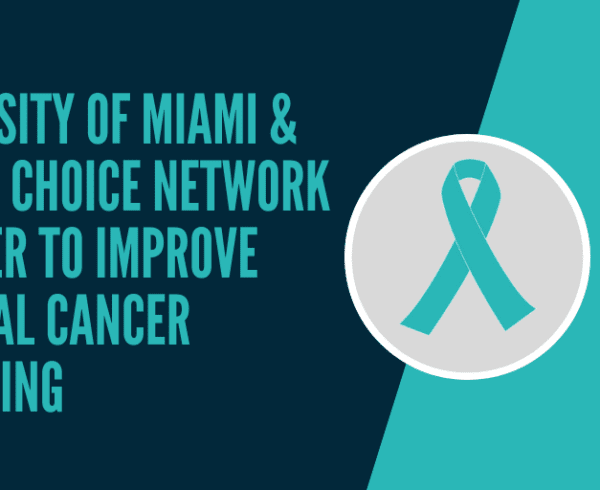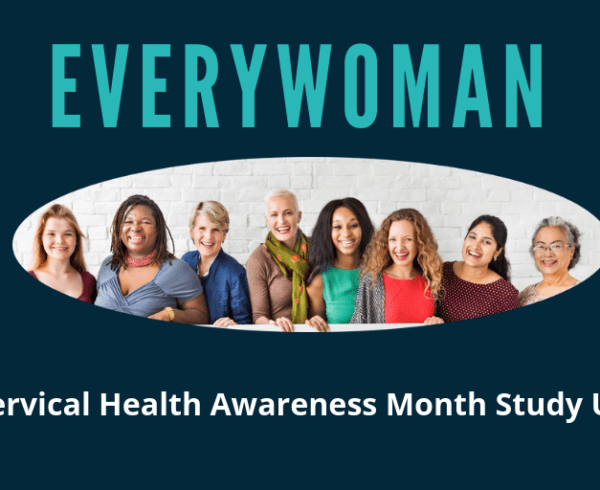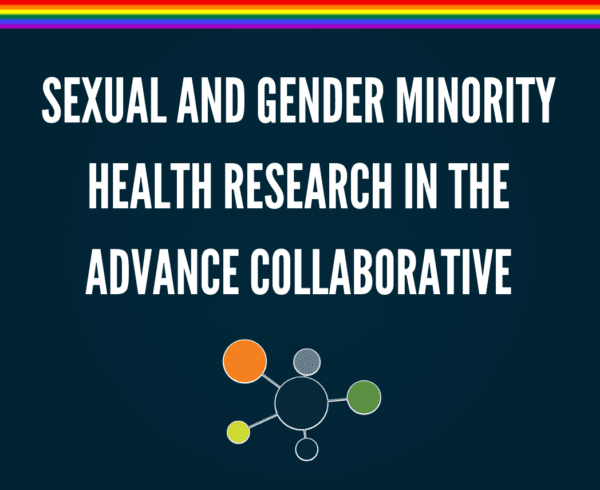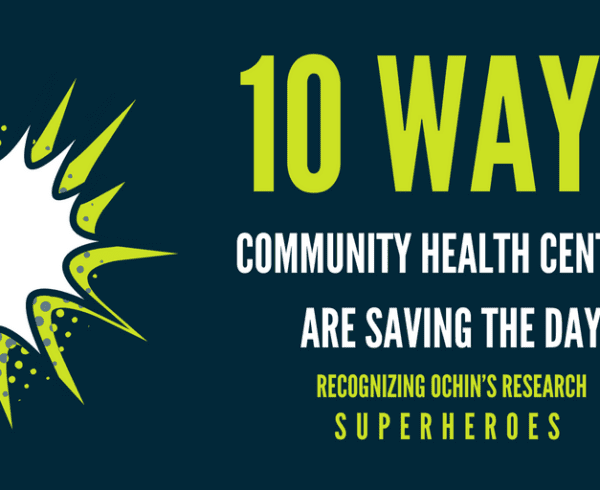ADVANCE recently launched EVERYWOMAN, a new study on reproductive health in the safety net, in partnership with Oregon Health & Science University (OHSU), Kaiser Permanente Center for Health Research, Fenway Health, and Health Choice Network. In honor of Cervical Health Awareness Month, we sat down with Project Director, Anna Templeton to learn more about the study.
Congratulations on your new project! Can you tell us a little about your study?
EVERYWOMAN (Reproductive Care in the Safety-Net: Women’s Health Care after Affordable Care Act Implementation) is a five-year study funded by the Agency for Healthcare Research and Quality (AHRQ) to understand the impact of the Affordable Care Act (ACA) and state health policies on women’s health care. EVERYWOMAN is the first R01 grant awarded to Principal Investigator, Dr. Erika Cottrell, and the first led directly by OCHIN as the primary institution.
EVERYWOMAN builds on a body of work at OCHIN led by Drs. Jen DeVoe and Blair Darney. Dr. DeVoe (senior research advisor at OCHIN and chair of OHSU’s Department of Family Medicine) has pioneered use of the electronic health record (EHR) to study the impacts of natural health policy experiments on patient health. Dr. Darney (a long-time OCHIN collaborator from the department of Obstetrics and Gynecology at OHSU) recently completed a ground-breaking study where she partnered with OCHIN to examine contraceptive care in the safety net after the ACA. Applying approaches and lessons learned in these previous studies, the EVERYWOMAN team will use electronic health record (EHR) data from the ADVANCE Research Data Warehouse (RDW) to evaluate women’s reproductive health care before and after ACA implementation between states that did and did not expand Medicaid eligibility. Our study will examine three broad outcomes: receipt of needed preventive care (e.g. cervical cancer screening and HPV vaccination), receipt of contraceptive and preconception care, and receipt of high quality care during pregnancy and postpartum.
Beyond the ACA, we also aim to study factors influencing women’s reproductive care at the patient, practice, and local policy levels. We will use a variety of patient, visit, practice, and community-level variables in the ADVANCE RDW as well as review of relevant state and regional policies to identify variations in the availability and quality of women’s health care. To provide context and help interpret our ADVANCE analyses, we will also reach out to four practices directly to spend time observing women’s health care in action, speaking with care providers and practice staff about their experiences, and listening to individual women tell their own reproductive health and care stories.
Why is ADVANCE interested in this project, and how may the results of this study inform health policy?
Women’s reproductive health truly impacts us all – we are all someone’s child and nearly everyone faces decisions about becoming or not becoming a parent. So, it is incumbent on all of us to make sure women receive the highest quality health care, particularly as it relates to reproduction. Evidence-based reproductive care for women improves the health of both women and children, reduces maternal and infant mortality, reduces generational health disparities, and is highly cost-effective. Anyone receiving or delivering women’s health care – from individual patients and their sexual partners, policy makers to care providers, public health departments, health centers, and community-based organizations – should be interested in learning about what makes for higher quality reproductive health care.
EVERYWOMAN is of particular interest to members of the ADVANCE network. Made up predominately of Federally Qualified Health Centers and community health center (CHC) lookalikes, ADVANCE serves a largely female (56%) population insured through Medicaid (48%) or without any insurance (24%). Women of reproductive age (15-44 years old) make up 25% of the average CHC population and CHCs serve the reproductive care needs of one in every five low income women. EVERYWOMAN focuses on this key population within ADVANCE while fulfilling ADVANCE’s aim to facilitate development of CHC-focused, equitable, cost-effective ways to improve care delivery and demonstrate quality.
Beyond ADVANCE, our study findings will be useful to policy makers at all levels of health service planning. With the impact of the Affordable Care Act and Medicaid expansion as our first aim, we have a central focus on federal policies influencing reproductive health care and coverage. In addition to ACA, we’ll examine variations in state level implementation of other federal programs such as Title X funding and the use of 1115 Medicaid Waivers to provider family planning services. Individual state policies will also be included in our analyses – laws and funding around sexual health education, prescribing, restrictions around family planning care or policies deliberately expanding access and coverage, abortion access, and post-partum Medicaid eligibility. Our intent is to assess the impact of national or state level policies on women’s reproductive care availability, access, and affordability. We’ll share our findings with policy makers and advocacy groups who can apply them in their efforts to improve reproductive health care systems from local to federal levels.
What is your role in this project?
I serve as the Project Director for EVERYWOMAN – liaising between research and study management to ensure we fulfill our aims and keep all the people and data included in our work safe and secure. I help develop our plans and tools for actually doing the study, spend time looking at other work in reproductive health to see where the gaps are or how we can help build on existing knowledge, collect state level policies, and connect with ADVANCE and OCHIN members to bring forward questions or feedback from patients and providers. I will also help lead the qualitative part of our study, going into clinics to observe care and speak with clinic staff, care providers, and patients about their experiences giving and receiving reproductive health care.
Our study team brings a wealth of diverse expertise, interests, and enthusiasm – all focused on improving the reproductive health of vulnerable populations. We’re a very collaborative team and while individual folks lead different areas, everyone contributes and helps to plan and conduct the work. I’d love to introduce you!
Lead investigators:
- Erika Cottrell, PhD, OCHIN – a sociologist and the principal investigator from OCHIN who leads our project and brings expertise in qualitative research and the impact of individual and community level social determinants of health (such as housing, income, education, employment, and other non-medical factors) on contraceptive, preventive, and pregnancy care.
- Brigit Hatch, MD MPH, OHSU – a family doctor and the site principal investigator from OHSU who has experience leading research assessing impacts of health policies with preventive care and will lead our work on women’s preventive care.
- Blair Darney, PhD, OHSU – a reproductive health services researcher who will lead our work on contraceptive care including counseling and advice, prescription or delivery of contraceptives, and use of long acting contraceptives such as IUDs.
- Maria Rodriguez, MD MPH, OHSU – an obstetrician and gynecologist and researcher who will lead our pregnancy-related work looking at prenatal and postpartum care provision and postpartum depression screening.
- Miguel Marino, PhD, OHSU – a biostatistician consulting on our data analysis plans and use of electronic health record data for policy research
ADVANCE partners:
- Fenway Health – Jennifer Potter, MD, Director of Women’s Health, and co-chair of the Fenway Institute leads Fenway’s inputs to study design, data, conduct, and sharing of findings
- Health Choice Network – Andy Brickman, PhD, Executive Director of Strategic Clinical Initiates leads HCN’s inputs to study design, data, conduct, and sharing of findings
Expert consultants:
EVERYWOMAN builds on two extensive bodies of previous research. First, a series of large studies examining the impact of the ACA in community health centers and the safety net led by Dr. Jen Devoe of OHSU. Second, the Community Health Applied Research Network led by Dr. Mary Anne McBurnie of Kaiser CHR which helped develop the capacity and infrastructure needed for a large network like ADVANCE.
OCHIN research team:
- Analyst Team – includes biostatistician Megan Hoopes and research analyst Lorie Jacob who design and conduct all the analyses for EVERYWOMAN
- Study Management Team – keeps the study running smoothly, safely, and on time, includes research associate Jee Oakley, study coordinator Nikki Stover, and myself
What aspect of the project are you most excited about?
I started my career as a nurse practicing at a rural primary care practice in the town where I grew up. I worked beside a family practice doc who I’d known as the mom of a friend and farmer before she went to medical school. I took the job because I knew I’d get to take part, and be mentored, in a wide range of reproductive care and expected to lead our participation in regional quality improvement efforts and research studies through our local PBRN. I had no idea what else was in store – our struggles (which at one point included a bake sale) to come up with the support and cash to stock mifipristone and a spare IUD, negotiating the enthusiasm and skepticism around HPV vaccination when it became available through our Child Health Insurance Program, our successful transition to FQHC status, the limitations of paper charts, one of my favorite teenagers sharing her birth control pills with her best friend, taking a colicky baby to my storage closet office and trying to return phone calls during a postpartum visit for a mother with severe depression.
I loved my work but I also loved the sense that through expanding our services, becoming an FQHC, building a network of community care providers, and taking part in research we were building a better system of health care for our patients. I eventually headed back to graduate school and got a DNP in Community Health Systems which has enabled me to further pursue my passion for practice-based, primary care systems research. Through EVERYWOMAN and OCHIN, I now get to connect back to reproductive health and the safety-net care community where I began my practice. I am so excited to be part of a project looking at the full spectrum of reproductive care in the context of both practice and policy – mobilizing the wealth of information from electronic health records and community level data while integrating the experiences and expertise of patients and providers through their stories of accessing and delivering care.
If you are interested in the EVERYWOMAN project, please do not hesitate to contact us with any question large or small! We will continue to share our progress in future and look forward to strengthening reproductive health in the safety net for everyone!









